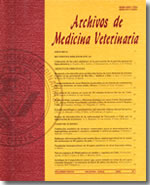Presence of parasite eggs with zoonotic potential in parks and public squares of the city of Temuco, Araucanía Region, Chile
Main Article Content
Abstract
Many parasitic infections can be transmitted from dog to man, which constitutes a risk to public health worldwide. The aim of this study was to report any presence of parasite eggs in soil samples from 87 parks and public places in 6 areas of the city of Temuco, located between 37° 24' and 39° 34'; latitude South, Region of Araucania, Chile. 193 three soil samples were collected, and 70 positive samples (36.3%) were obtained by using the modified method of Fonrouge. In 48.3% of the parks, the eggs found corresponded to the genders Toxocara sp. (12.4%), Taenia sp. (11.4%) and eggs of Trichuris sp. (4.7%). Also, a set of eggs identified as Strongylid (9.3%) was found, but it was notpossible to determine whether they were parasites or free life helminthes. In addition, 2.8% of the samples showed polyparasitism. According to Fisher's exact test, there was no statistical association between the type of topsoil of the park and the type of contamination; and no differences were found between risk of infection and studied area. Results showed that parks and public places of Temuco are contaminated with parasite eggs mainly associated with dogs, posing a potential hazard to human health.

